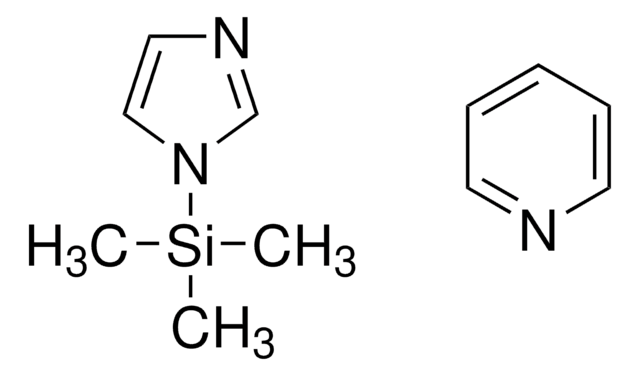394874
1-(Trimethylsilyl)imidazole
for GC derivatization, LiChropur™
Synonyme(s) :
N-Triméthylsilylimidazole
About This Item
Produits recommandés
Qualité
for GC derivatization
LiChropur™
Niveau de qualité
Pureté
≥94.0%
Pertinence de la réaction
reagent type: derivatization reagent
reaction type: Silylations
Technique(s)
gas chromatography (GC): suitable
Indice de réfraction
n20/D 1.475 (lit.)
Point d'ébullition
93-94 °C/14 mmHg (lit.)
Densité
0.956 g/mL at 25 °C (lit.)
Chaîne SMILES
C[Si](C)(C)n1ccnc1
InChI
1S/C6H12N2Si/c1-9(2,3)8-5-4-7-6-8/h4-6H,1-3H3
Clé InChI
YKFRUJSEPGHZFJ-UHFFFAOYSA-N
Vous recherchez des produits similaires ? Visite Guide de comparaison des produits
Catégories apparentées
Description générale
Application
Autres remarques
Informations légales
Produit(s) apparenté(s)
À utiliser avec
Mention d'avertissement
Danger
Mentions de danger
Conseils de prudence
Classification des risques
Acute Tox. 4 Oral - Eye Irrit. 2 - Flam. Liq. 2 - Skin Irrit. 2
Code de la classe de stockage
3 - Flammable liquids
Classe de danger pour l'eau (WGK)
WGK 3
Point d'éclair (°F)
42.8 °F - closed cup
Point d'éclair (°C)
6 °C - closed cup
Équipement de protection individuelle
Eyeshields, Faceshields, Gloves, type ABEK (EN14387) respirator filter
Faites votre choix parmi les versions les plus récentes :
Déjà en possession de ce produit ?
Retrouvez la documentation relative aux produits que vous avez récemment achetés dans la Bibliothèque de documents.
Les clients ont également consulté
Notre équipe de scientifiques dispose d'une expérience dans tous les secteurs de la recherche, notamment en sciences de la vie, science des matériaux, synthèse chimique, chromatographie, analyse et dans de nombreux autres domaines..
Contacter notre Service technique










